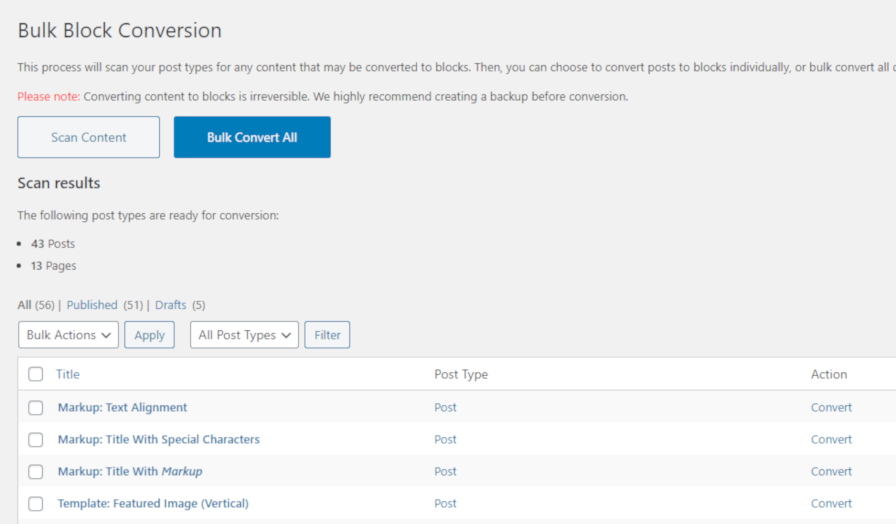Last week GitHub announced the beta release of the GitHub Actions API. Today, the company is expanding the availability of the API to include all repositories. Additionally, GitHub provided us with a little more detail on the API’s benefits to users.
Convert Classic Content to Blocks With the Bulk Block Converter Plugin
Organic Themes released the Bulk Block Converter WordPress plugin last month and updated it in the past week. The plugin allows users to convert classic content, written in the old editor, to the new block format.
Unless end-users have the Classic Editor plugin installed, their old content is placed into the classic block in the newer block editor. WordPress provides an option for transforming this content into individual blocks from the block-editor interface. However, this must be done on a per-post basis.
“Going back and converting each post and page with a classic block to individual blocks can be a very long and tedious process,” said David Morgan, co-founder of Organic Themes. “The Bulk Block Converter plugin quickly scans all your posts and pages for classic blocks, and allows you to quickly convert them all to individual blocks within one interface.”
Originally, Organic Themes built the plugin for internal use at their company. “We developed the plugin to help us convert the content of our theme demos to blocks more efficiently,” said Morgan. The company had to convert over 40 theme-demo sites with an average of 50 posts and pages per site. They built this plugin to avoid a long and painstaking process. Then decided to share it. “We thought the tool could be very useful for other users migrating to Gutenberg.”
For users with a lot of old content, Bulk Block Converter could be the key to moving it all to the new block editor system. Based on the conversions I ran on a couple of test installations, it worked flawlessly.
How the Plugin Works

The Bulk Block Converter plugin adds a new “Block Conversion” sub-menu item to the WordPress “Tools” menu in the admin. Once on that screen, it provides a “Scan Content” button. When clicked, it checks all of your posts, pages, and other custom post types for classic content. It then builds a list table of all the content.
From that point, you can choose between converting each post individually or running a bulk conversion of all posts. I always recommend being cautious with such plugins by converting and checking a couple of individual posts before trying bulk conversions.
The process for converting posts was snappy during my tests. In just a few moments, I converted all of my old content over without issue.
Like any plugin that modifies content in this way, it is prudent to store a backup of your site before converting the posts. This is also a one-way conversion process. Once a post is transformed, there is no going back.


